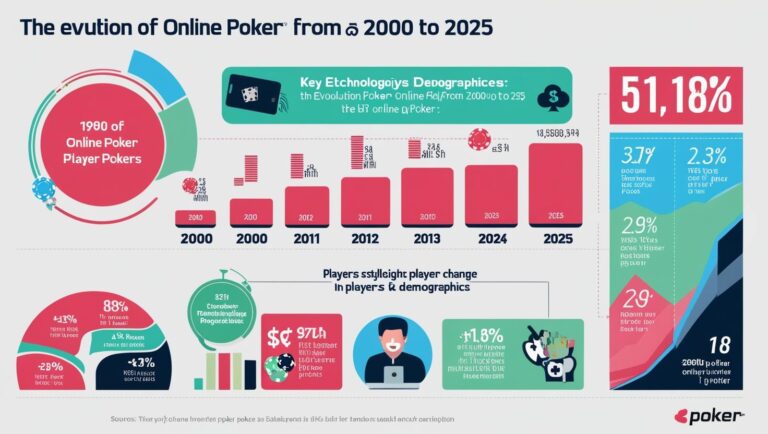The landscape of poker has undergone a transformation since the turn of the millennium, driven by advancements in technology and widespread internet access. From its humble beginnings to becoming a global phenomenon, online poker’s journey is a tale of dramatic growth, significant challenges, and relentless innovation. As we trace its path from 2000 to 2025, we explore the pivotal moments that have shaped this digital card game sensation.
The Rise of Online Poker: 2000-2010
The early 2000s marked the dawn of online poker, as technological advancements and increasing internet penetration provided fertile ground for new poker platforms to emerge. Initially dominated by brick-and-mortar casinos, the poker scene witnessed a seismic shift with the launch of platforms such as Planet Poker in 1998, followed by PartyPoker and PokerStars in the early 2000s. These platforms embraced digital connectivity, allowing players from around the world to compete from the comfort of their homes. The convenience and accessibility of online poker led to a surge in popularity, setting the stage for the game’s explosive growth over the decade.
A significant catalyst in online poker’s ascension was the 2003 World Series of Poker (WSOP) victory of Chris Moneymaker, an amateur player who qualified through an online satellite tournament. His historic win, often referred to as the “Moneymaker Effect,” inspired a new generation of players and demonstrated the potential of online poker as a legitimate pathway to poker success. This phenomenon sparked a poker boom, with the number of players and the prize pools in online tournaments skyrocketing in the years that followed.
By the end of the decade, online poker had firmly established itself as a mainstream form of entertainment and competition. Major tournaments, such as the World Championship of Online Poker (WCOOP), emerged, offering substantial prize pools and attracting top talent from around the globe. The rise of online poker also coincided with the growth of poker-related media content, including television broadcasts and strategy books, further fueling the game’s popularity and cementing its status as a cultural and social phenomenon.
Challenges and Growth: 2011-2025
The period following 2010 saw online poker grappling with regulatory headwinds and legal challenges, particularly in the United States. The most notable event was the “Black Friday” crackdown on April 15, 2011, when the U.S. government unsealed indictments against major poker sites, including PokerStars, Full Tilt Poker, and Absolute Poker, charging them with bank fraud, money laundering, and illegal gambling. This led to the shutdown of these sites in the U.S., causing a major disruption in the online poker industry and highlighting the need for clearer regulatory frameworks.
Despite these setbacks, online poker continued to evolve and adapt. Efforts to legalize and regulate online poker gained traction in various jurisdictions, with several U.S. states such as Nevada, New Jersey, and Delaware paving the way for legal online poker operations. Internationally, various countries embraced online poker, implementing regulatory measures to ensure player protection and fair play. This period also witnessed technological innovations, such as the integration of mobile platforms and virtual reality, which enhanced the gaming experience and attracted a new generation of players.
As we approach 2025, online poker remains resilient, facing challenges head-on while continuing to expand its reach. The global pandemic in 2020 accelerated the shift toward digital entertainment, with online poker experiencing a renaissance as live poker events were put on hold. Looking forward, the industry is poised to leverage emerging technologies, such as artificial intelligence and blockchain, to enhance security, transparency, and user experience. With ongoing regulatory efforts and technological advancements, online poker is set to continue its journey as a dynamic and integral part of the global gaming landscape.
From its inception at the start of the new millennium to its evolution in the face of legal and technological challenges, online poker has charted an extraordinary course. The game’s adaptability and appeal have ensured its resilience amidst shifting landscapes and regulatory climates. As we look toward 2025 and beyond, online poker’s journey serves as a testament to the power of innovation, the enduring allure of competition, and the universal appeal of this timeless card game.



















0 Comments